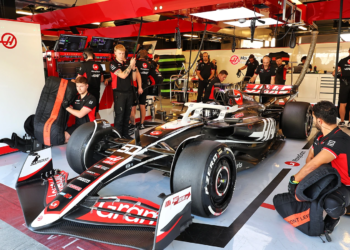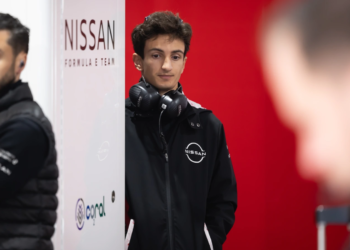It is an important and popular fact that things are not always what they seem. Not for the first time a Hitchhiker’s Guide to the Galaxy line is a useful one.
You’ll be aware by now that our 2019 driver market silly season has had yet another dramatic twist. Ferrari’s decided after all to go with the driver line-up plans of its recently sadly departed president Sergio Marchionne. For the first time in a long time it has rolled the dice – youth and potential in Charles Leclerc has been preferred to incumbent Kimi Raikkonen’s known and steady quantity.
Virtually all of the analysis in response to this, aside from what this tells us about Leclerc of course, has been focussed on what it tells us about Raikkonen – i.e. the extent that he deserved Ferrari retention or otherwise.
But, for the significance of this particular Ferrari decision, are we looking in the wrong place? Is the most significant part by a distance not what it tells us about Raikkonen, but in fact what it tells us about the other Ferrari driver; the one seen as the fixture – one Sebastian Vettel?
F1 journalist Mark Hughes suspects so. Here’s what he said in a recent article. “Based on a few insights from someone deeply connected for many years to the very senior management, this move – initiated by the late Sergio Marchionne – wouldn't be so much about dissatisfaction with Raikkonen’s performance as it would be about Sebastian Vettel’s.
“The political tides haven’t actually turned against Vettel – yet – but Marchionne was always a man with challenging questions. One of those questions was whether Raikkonen was a driver quick enough to give an accurate perspective on Vettel.”
This move – initiated by the late Sergio Marchionne – wouldn't be so much about dissatisfaction with Raikkonen’s performance as it would be about Sebastian Vettel’s – Mark Hughes
In other words, were Ferrari’s ‘number one’ driver a known top echelon quantity – which, as Hughes goes onto indicate, was the case with Vettel’s predecessor Fernando Alonso – Raikkonen’s skillset across the garage would be ideal. Good technically. Consistent. Fast but not too fast. Won’t rock the boat. A perfect number two really.
But, so parts of Ferrari seniority think, Vettel doesn’t quite so clearly have that status. At the very least there are doubts and Raikkonen’s not providing the required yardstick to resolve them. So the Finn is ditched.
The decision doesn’t look good for Vettel’s relations with his team on a couple of other levels either. For one this is a move minded at some level of looking beyond Vettel; Leclerc, if he’s as good as they say, will solve the Vettel succession issue.
It also says something about how much intra-team sway Vettel has (or hasn’t). It’s clear that the decision to lose Raikkonen and bring in Leclerc is not Vettel’s choice. Vettel never missed opportunities to advocate Raikkonen’s retention (we can understand why – and it goes beyond that they’re fairly matey). From his demeanour in Singapore Vettel regards the decision to promote Leclerc with all of the enthusiasm of a parent contemplating their errant teenage son’s latest tattoo.
The Vettel-Ferrari relationship has for a while been an interesting one. The default assumption has often been that everything with the cherubic perma-smiling Seb and his team is rosy. This again is in stark contrast to his Spanish predecessor, wherein observers it seemed were constantly poised to see evidence that the whole relationship was going to combust that very second. We might recall as one example the time Alonso committed the heinous offence of sarcastically calling his team “geniuses” on the team radio – and the subsequent reaction was akin to that usually reserved for the end of the world being nigh. Plenty, really, speculated that he’d be sacked that day.
Likely it says something about how reputations precede.
The default assumption has often been that everything with the cherubic perma-smiling Seb and his team is rosy – in stark contrast to his Spanish predecessor. Yet the Vettel-Ferrari bill of health hasn’t been entirely clean either
Yet the Vettel-Ferrari bill of health hasn’t been entirely clean either. It seems trouble started towards the end of their difficult 2016 campaign, when things bubbled below the surface and indeed it got public, with Vettel’s immediate boss Maurizio Arrivabene stating Vettel should stick to the driving instead on sticking his nose into team running. For someone like Vettel – one who among other things lauds the very holistic Michael Schumacher – it could have been designed to wound. Perhaps it was.
And since, while things have remained just about civil, it’s never been glad confident morning again. Just recently we can add Vettel berating team members on the radio at Spa for how they were pushing his car, followed by his rather loaded-sounding “we’ll talk later” at the end of Monza’s qualifying when he missed out on pole. As well as that in qualifying and the race there it wasn’t clear how much Ferrari was stacking the deck in his favour. Slightly strained team-driver debates on strategy via the radio are also fairly frequent.
And as Hughes outlined, relations with Marchionne seemed a particular iffy point. Vettel indeed had often seemed conspicuously more agitated when Marchionne was in the house. This was seen quintessentially in his bizarre and shrill dressing down of Daniil Kvyat after a first corner incident in the 2016 Chinese Grand Prix in which the two Ferraris collided and few could work out really what Kvyat was supposed to have done wrong.
It was noticeable also that Marchionne didn’t follow his driver’s interpretation of events. “This is the first time that the two drivers have ever collided and it isn’t something you usually see with Ferrari,” he said afterwards on TV. “I’m more embarrassed for them than me, if I’m honest.”
As noted Marchionne now is recently sadly departed, but again judging by the Leclerc decision Ferrari for now at least is determined to continue his ways. And in any case the Ferrari doubts about Vettel weren’t confined to Marchionne.
Another problem Vettel has is that history is well against him. Something almost constant in the Scuderia’s past is that while Ferrari does fantastic honeymoon, its new driving recruits hailed as the grand new saviour, the team’s relationships with its lead drivers pretty much always end badly. And it doesn’t seem to matter how much success they bring to the Scuderia.
Another problem Vettel has is that history is well against him. Something almost constant in the Scuderia’s past is that the team’s relationships with its lead drivers pretty much always end badly
The Commendatore Enzo Ferrari was notorious for being harsh to drivers of course, but it seems that the attitude has lived beyond him. It’s almost like there’s something wilful in asserting after a while that no driver is bigger than this grandest of teams. You might even go deeper and say it reflects a quasi-religious worship and then periodic sacrifice of a sacred messiah figure.
Vettel in any case might not be best advised to fall back on his Ferrari record in his case for the defence, given those who doubt him can suggest credibly that his driving errors went some way losing a championship last year as well as to him being currently on the way to losing another possibly. And again to take a converse Alonso comparison, while Alonso’s Ferrari spell seems to be viewed in hindsight rather as a failure he at least can say he took the title to the last race twice – and twice more than Vettel has. And Vettel likely has had the more competitive equipment.
The historic examples that should give Vettel caution flow easily. Juan Manuel Fangio left Ferrari after a single season wherein he grated constantly with the management. Peter Collins’ journey from Enzo’s ‘surrogate son’ to a persona non grata took less than two years. John Surtees stormed out in mid-1966 after a series of run-ins with the eccentric team manager Eugenio Dragoni who wasn’t terribly responsive to what John reckoned were the car’s shortcomings.
Vettel would be far from the first to think that at Ferrari things would be different for him. And be disabused of the notion
Niki Lauda fell seriously out of love with the Scuderia to the point of walking out early, mainly as it lost faith in him clumsily and egregiously following his fiery Nurburgring accident. Gilles Villeneuve – often cited as the quintessential Ferrari driver – spent the last two weeks of his life utterly disillusioned with the squad for not backing him after being ‘duped’ by team-mate Didier Pironi in Imola, and resolved to leave.
Alain Prost was chased out amid a time-honoured Maranello meltdown in late 1991. We know the one about him comparing his Ferrari to a truck; less well-remembered is that when he did so he was referring to the car’s handling after the shock absorbers had failed, rather than generally.
Even Michael Schumacher’s Ferrari departure – after five world championships – was messy, with Luca Montezemolo conspicuously looking to the next generation. Raikkonen was chased out the door just two years after winning Ferrari’s last title. Alonso we’ve mentioned. There are others too. While you can add over and above that Ferrari managed in advance to seriously alienate Stirling Moss and Jackie Stewart to the point that both resolved never to drive for the Italian squad.
Vettel would be far from the first to think that at Ferrari things would be different for him. And be disabused of the notion.






